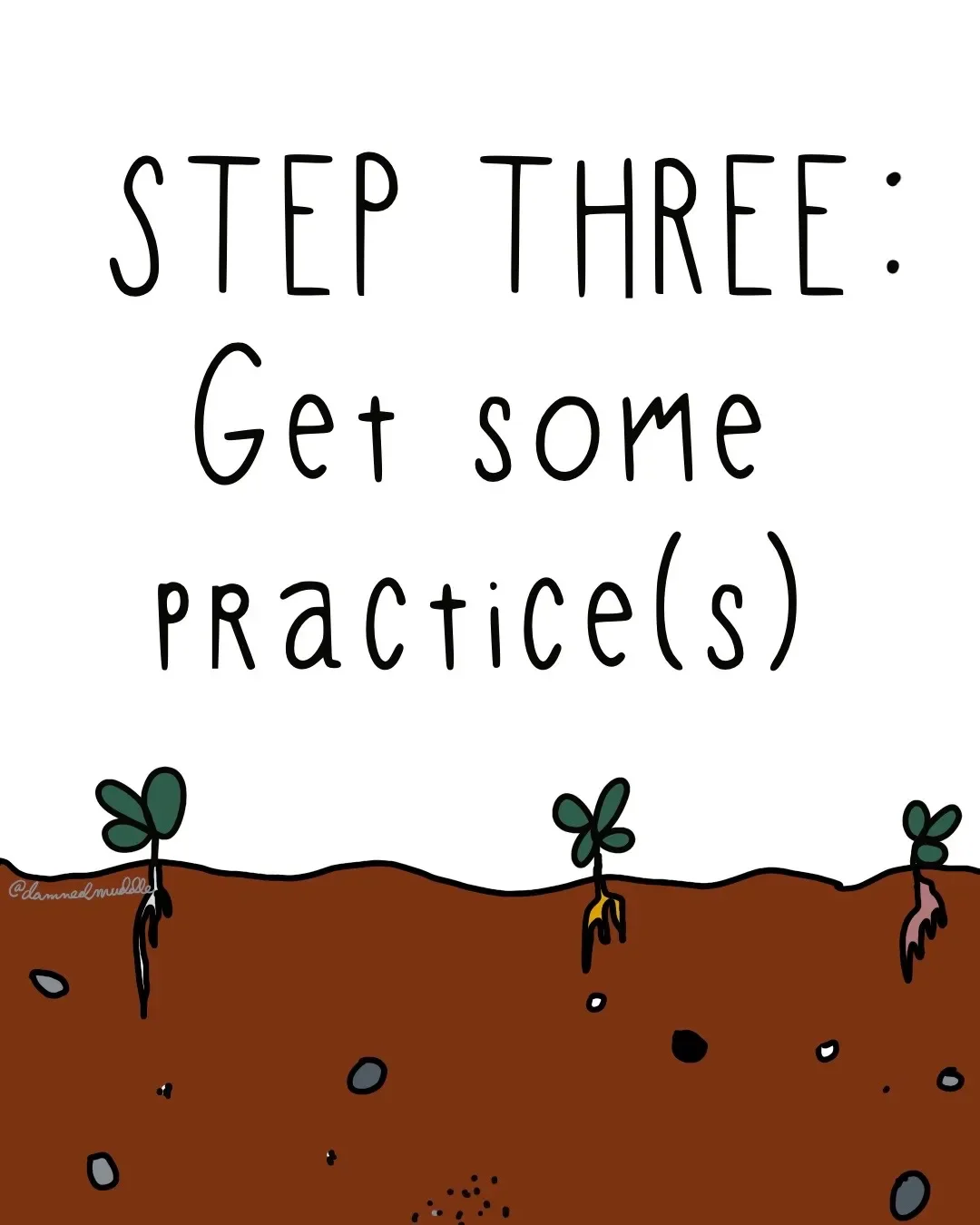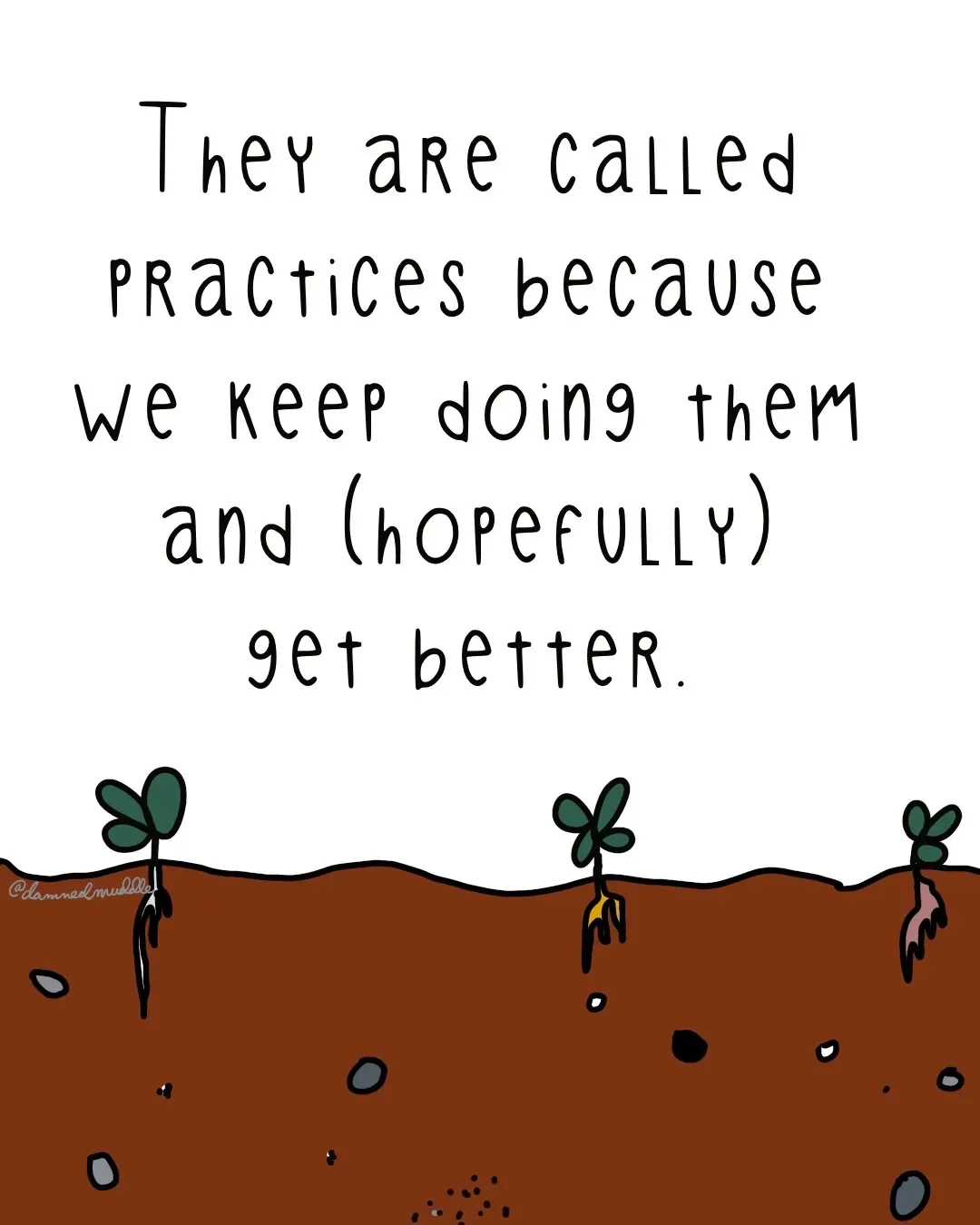Liberation work from the ground up: Get some practice(s)
Welcome back!
Remember as we get into this that we are doing slow, intentional work that lays the groundwork for us to be safe in community and liberation movements.
If you want to skip these things, you are unsafe to do the work. If you think they don’t apply to you, you’re unsafe to do the work. Take the time to make yourself a safe(r) person. This section contains a lot, so feel free to pause and revisit as you tackle different parts.
Illustration of dirt with three clovers and hand lettering that reads, “Step three: get some pratice(s)
Step Three is get some practice(s).
We are going to cover some basic practices us white folks can engage in to make us safer community members and better prepare us for liberation work.
Those practices are:
Grief
Self care
Shadow work
Conflict resolution
Imagination
Grief: You need a grief practice. Life is grief. Bad things will happen. People you love will die. And at the end you will too. It doesn’t matter how many positive affirmations you do, that’s where we are all headed.
When you have a grief practice, you practice acceptance of that reality and you are better prepared when those times come. When you are better prepared, you can more easily return to self care, accept community care, and provide care for others also grieving.
Having a grief practice means you will be better at holding space for the grief of others. It will make you less likely to turn your attention away from issues that need your attention.
We call it a practice because you have to keep doing it. You can’t just do it once and be done. Not only will you encounter more grief, but you never know when it will affect you or someone you love. The more you practice, the safer you become for people in tough situations or when you have a tough situation.
Some of you still haven’t grieved how the pandemic changed us. Some of you aren’t properly grieving these election results. If you are trying to jump right to action, particularly if you’re skipping the steps I’ve laid out so far, chances are you are trying to avoid grief. Avoiding grief makes you an unsafe person.
Self care: We need to be careful in this one. You need a self care practice but not in a way that supports consumerism and spending. Not in a way that is led by thin white women. Not in a way that is trying to sell you something or dismiss the experiences of the most oppressed.
You need a self care practice to stay alive and well enough to do the work.
This looks like rejecting martyrdom and engaging in restorative rest.
It looks like knowing the difference between boundaries and rules.
It looks like learning how to resource and accomodating yourself.
Martyrdom is tempting for white women. We’ve so often been required to do more work than our male counterparts that it’s often the only way we think we can get attention and care.
The trouble is it doesn’t actually get us what we need. It sets us up as a victim even though under white supremacy we are often the problem.
Everyone deserves the rest they need to function as well as they can for each day.
But we need to remember that the ability to rest is a privilege and the most marginalized individuals need it most.
Do you know the difference between boundaries and rules?
Boundaries are put in place to outline what YOU will accept from others and rules are you trying to tell OTHERS what to do.
We want boundaries not rules.
If you have a lot of rules for others, it’s likely cause you haven’t put enough boundaries in place.
What white people often do is fail to put boundaries in place for themselves around other white people and then try to use rules to take the resulting emotions and consequences out on people of the global majority.
One of the ways to know what boundaries need to be set is to start to know what resources and accommodations you need. Many of us stay so busy and distracted that we never figure out what we need to be truly taken care of and accomodated.
So many people are dealing with new disabilities since 2020 that they haven’t yet admitted or adjusted to.
If we do not know what care we need and how to accept it from others, we are in no place to try to care for others.
This isn’t an excuse to spend more money on leggings or wellness retreats. This is an invitation to do the revolutionary work of knowing yourself and asking for help if you need it (and we all need help sometimes).
In order to really know ourselves, we need to do shadow work.
Again, this isn’t an invitation to spend money on crystals and tarot cards. (Although if you are going to spend money support creators of the global majority doing this work*)
It’s the work we do to acknowledge that everything has good AND bad, strengths AND weaknesses. That includes us.
If you do not acknowledge your weaknesses, vulnerabilities & shadow side, you are going to cause harm to others. Not only that but people will also be less safe to be their whole, complicated, messy selves with you.
Which leads to the next point: You need to have a conflict resolution practice.
It’s fun to say we want to be in community, but people seem to forget that being in community requires room for disagreement and conflict resolution.
If people can not tell you that they have a problem with you without you calling the manager, cops, or HR, you are not a safe person.
You can decide what works best for you to develop a conflict resolution practice (remember practice means ongoing), but it probably includes a journal for self reflection and some real life practice with white people you trust who can trust you.
“Harvesting Chaos” is a book by an author of the global majority that may help you work through some of these practices.
Illustration of dirt with two clovers and hand lettering that reads, “They are called practices cause we keep doing them and (hopefully) get better”
Finally, it’s really important as we start to do this work that we develop an imagination for how things might be different.
When we are scared and angry, we aren’t usually strategic. And the work the world needs us to do is strategic. One way to start is to be able to imagine where you want to go.
SatrayReads made this point really well and had the suggestion that before we read liberatory nonfiction, we read speculative fiction.
Here are a list of some speculative fiction books to help jump start your imagination:
Anything by N.K. Jemisin, Octavia Butler, or Nnedi Okorafor,
specifically, “How Long ‘Til Black Futures Month?” By N.K. Jemisin and
“Binti” by Nnedi Okorafor
“An Unkindness of Ghosts” by Rivers Solomon
“Raybearer” by Jordan Ifueko
“Long Division” by Kiese Laymon
“Cemetery Boys” by Aiden Thomas
That was a lot to cover. Please remember that if you have questions or need to process, you are welcome to do that in any of my spaces, but not those of the folks I have linked here.
I would love to hear how it’s going and I’ll be back soon with more.



